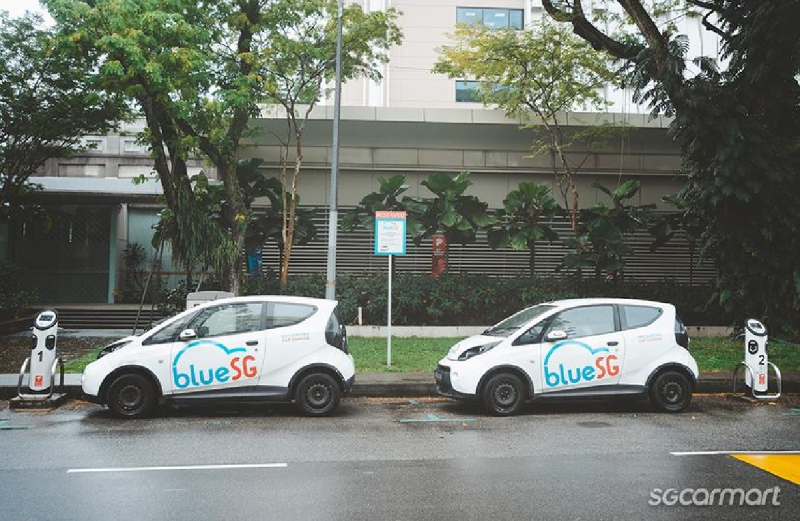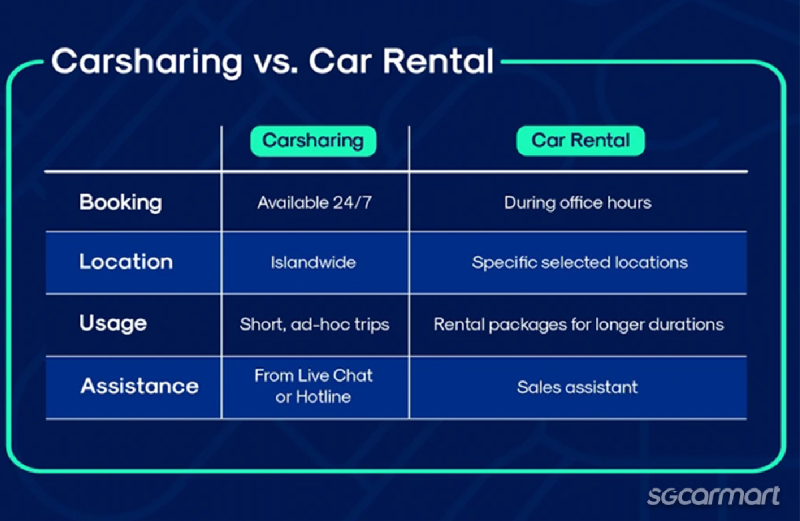At a crossroads: Car-sharing and car ownership

BlueSG, GetGo, Tribe car, DriveLah, Shariot. These are but just some of the car-sharing firms that have earned themselves a cut of the Singapore market. Surely, there are more - be it medium or small - that have snuck their way in, and growing in stealth.
Car-sharing is a thriving business. It's probably also the only part of the sharing economy that has achieved such resounding success. On homeground, the number of users on car-sharing platforms in 2022 stood at about 430,000 (according to Statista). This puts car-sharing right at the midpoint of car ownership, which totalled 995,746 in the same year.
With car-sharing steadily gaining a following in Singapore, one possibility I often find myself wondering is whether car-sharing will one day replace car ownership. I'm likely not alone in thinking this because car-shares are almost a direct substitute for privately owned cars.
What's there not to want when the former offers the same private, self-driving experience (less the hassle and financial obligations that comes with vehicle ownership) that most drivers dream of?
To me, at least, local conditions do seem poised for us to have a bright future with car-sharing.
The extent of how unaffordable a car can be in Singapore is real and tangibly appalling. Thanks to high taxes and our uniquely Singaporean Certificates of Entitlement (COEs), a car in our little city-state can actually cost more than a house.
Remember when our COE premiums hit record highs in October this year? Even as they have fallen considerably across all categories in the last bidding round of 2023, premiums are still at one of their highest levels historically.
Just as the ups and downs of the stock market encourage a wait-and-see approach, so do the highs and lows of COE premiums.
Many aspiring car owners could well be waiting for prices to fall further before they head to the showrooms. In the meantime, car-sharing services could serve as the next best alternative to driving a personal car.
For those on the other end of the spectrum, car-sharing is a preferred lifestyle choice.
These consumers consciously decide not to commit to the high vehicle maintenance, costs, and attendant constraints of car ownership. Under such circumstances, consumers will gravitate towards car-sharing, which by nature of the pay-as-you-use model, is the relatively more cost-effective option.

How assimilated is Singapore's society to car-sharing? With only 7.6 per cent of our 5.64 million population being regular users of car-sharing services last year, it's safe to say we are still very much in the early adopter stage.
But this figure is set to increase. As existing players expand and new ones enter the market spurred on by the success stories of incumbents, more consumers will take to car-sharing with time. This is the influence of ubiquity, and a natural trajectory if we were to follow the path paved by early adopters of innovation.
It is also supported by the Theory of Planned Behaviour, which comprises consumer attitudes towards and perceived control over getting around by means of car-sharing.
Car-sharing can bring people together simply by the use of common cars. Those who enjoy being part of a larger community may be drawn to the spirit of sharing, inherent in this business model.
This underpins the increasing bouts of consideration exhibited by users of car-sharing platforms. Examples include the timeliness with which customers are returning shared cars and the condition of the fleet cars after use.
The desire for fewer material possessions, which motivates the preference for a more fuss-free lifestyle - one that's independent of owning a car - is another compelling reason to car-share.
Industry players have observed an uptick in demand for car-sharing and car-leasing services owing to a growing interest in sustainability amongst millennials and Gen Zs.

Once an unpopular pick because of perceived difficulties in bringing children around in shared or rented cars, this is no longer the case with improved technology. Companies like BlueSG and GetGo are, in actuality, enabling mobility via their platforms by matching the demand for vehicles with supply.
This addresses the apparent lack of control stemming from the unpredictability of car-sharing in the past. With today's technology, the availability of vehicles on demand affords users greater certainty in planning their journeys and securing 'private' transport without having to own one.
On the contrary, ride-hailing services (a popular alternative to car-sharing) are invariably more uncertain due to indefinite waiting times and possible booking cancellations by drivers.
The car-sharing boom in Singapore is almost definitely helped by our high population density: Having more people per square metre means hitting targets even with a small fleet of vehicles to mobilise across the island.

Cost-wise, shorter distances between travel points in our small country make car-sharing a sensible transport decision. This is possible since most providers offer a time-based payment model. Together, these contribute to a higher usage frequency of car-sharing services.
Let's also not forget the growing reach of our public transport network that's increasingly relegating private car ownership to redundancy. Car-sharing, on the other hand, may fill an important gap by running complementary to public buses and trains when bridging last-mile commutes.
The ease of pre-booking and using car-sharing services naturally makes them the go-to if some degree of privacy while travelling is preferred as well as on trips that can be planned ahead of time. Its transience could well be its winning quality in a car-lite future.
Statistically, the odds - in the grand scheme of sustainable transport of the future - are very much in favour of car-sharing.
In land-scarce Singapore where roads occupy 12 per cent of our total land space, the sustainability of our transport system as a whole requires us to rethink our relationship with vehicles.
[[nid:615262]]
A car-lite future may mean reduced reliance on privately owned cars. But that doesn't necessarily translate into a tomorrow with no cars. Instead, it encourages us to maximise our use of existing resources, and one way to do so is through car-sharing.
With a larger proportion of Singaporeans being non-car owners and our zero-vehicle growth stance since 2018 inhibiting the registration of new vehicles, it is quite clear that car-sharing offers an accessible avenue to vehicles without actually having to own one.
Said unaffordability of car ownership in Singapore and accompanying inconveniences are also reasons enough to continue keeping non-owners out of the market.
This, in itself, is a triumph of car-sharing over car ownership. And perhaps, a nod to the possibility of car-sharing becoming the new, desired love interest in (almost) every Singaporean's car dream.